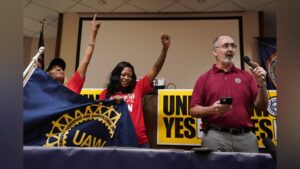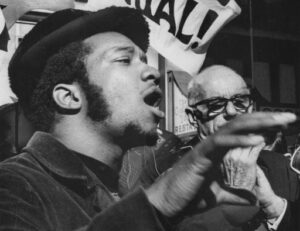The 2024 presidential election is still 15 months away. The primary season won’t even begin until January.
Yet opposition is already mounting against Black scholar and activist Cornel West’s third-party challenge in the next election. It is perhaps not too surprising that the loudest opposition to West is coming not from the Democratic Party establishment (Joe Biden’s reelection campaign claims it is not worried) but from the self-identified left.
Is Cornel West to blame if Biden loses in 2024?
An array of liberal and left-wing pundits is already blaming West in advance for the unpopular Biden’s (potential) loss to the (as yet unnamed) Republican candidate next year. Apparently, the conventional wisdom even among most self-described socialists is that it is our job to ensure Biden’s victory, even though he has done nothing to earn it.
On June 5th, West announced he planned to run, stating “I am running for truth and justice as a presidential candidate for the People’s Party to reintroduce America to the best of itself—fighting to end poverty, mass incarceration, ending wars and ecological collapse, guaranteeing housing, health care, education, and living wages for all!”
These would seem to be admirable ambitions for all those seeking progressive change, but West’s announcement was instead greeted with near unanimous scorn from liberal and left political figures.
The liberal Nation magazine was the first out of the gate, publishing an article by national correspondent Joan Walsh headlined “Cornel West should not be running for president.”
Walsh claimed (as if to justify her soon to follow condemnation of West), “I loved early Democratic Socialists of America leader Cornel West. I loved author of the 1993 book Race Matters. I loved everything about West until he supported spoiler Ralph Nader against then–Vice President Al Gore in 2000.”
But, she added,
A lot of my political friends supported Ralph Nader back then. And a lot of them have since apologized. Even Michael Moore. The Iraqi people, and the people of the entire globe, are so much the worse since Gore, the climate-change believer and war skeptic, was defeated by George W. Bush that year, with an assist from the Supreme Court. And Nader’s Green Party.
West never apologized. He didn’t see a third party playing a spoiler role to Democrats as bad—obviously, since he’s about to do it again…
[I]n West’s case, running as a third-party candidate poses a far more serious risk to Biden’s reelection and to the fate of the country. Just be clear: He will only take votes away from Biden and help elect a Republican.
The disparagement of West’s third-party candidacy has only grown since June 14th, when he announced that he was seeking the nomination of the Green Party.
Should West run as a Democrat to be more “relevant”?
D.D. Guttenplan and Bhaskar Sunkara, writing in The Nation, made the case that West should run in the Democratic primaries like Sen. Bernie Sanders did in 2016 and 2020. They conceded, “The reason for West’s choice is clear: In our hardly democratic two-party system, acting as a spoiler in a close race is the closest a third-party candidate can come to relevancy.”
They went on to argue,
[I]f Donald Trump remains in serious contention next year, that is a risk no progressive can dismiss.
The fact that Biden’s first term has matched every success with disappointment doesn’t change that calculus. He expanded pandemic relief and health coverage with the American Rescue Plan—but then let many of those measures lapse. He advocated climate and industrial policy initiatives with the Inflation Reduction Act—but also approved a massive new drilling project in Alaska. The choice between four more years of Biden or Trump is not difficult. But if ever there was a president in need of a left opposition, it’s the longtime centrist now in the White House.
The authors claim that West should run against Biden in the Democratic primaries next year or remain in “the margins”: “Running as a Democrat would transform West’s candidacy from a sterile exercise into a vehicle for redeeming our politics from the corporate complacency and soul-crushing cynicism about democratic politics that serves only those already in power.”
Perhaps they have already forgotten that the Democratic Party establishment, faced with Sander’s rising popularity among Democrats in 2020, successfully ramped up its well-financed efforts aimed at ruining Sanders’ chances at leading in the rest of the primaries, pushing him out of the race altogether..
Also, exactly how marginalized is West’s campaign? His own reputation as an accomplished academic and deeply committed socialist activist has already given him access to major news outlets. He is a long-standing member of the DSA, and once its honorary chair. Besides his academic achievements (which are many), West is also a long-standing activist, who has been arrested numerous times—from protests against South African apartheid to Black Lives Matter. He was part of the Occupy Wall Street protests in 2011 and is a consistent supporter of Palestinian freedom from Israeli occupation. Very few Ivy League professors would venture into this political territory in these difficult times.
These are the reasons why the mainstream media has covered his campaign, even as a third-party candidate. He will no doubt be shut out of any televised official debates—but that is because of the archaic rules both Democrats and Republicans use to exclude most third-party challengers.
On July 13th, West was able to make this full comment on CNN: “I want to head the US empire in order to dismantle it. We need to be a nation among nations. We don’t need to be the grand empire that every nation has to bow down to. I am anti-imperialist. NATO is an instrument of US global power.” How often do television viewers get to hear a presidential candidate make remarks like West’s? Would they be hearing this anti-imperialist viewpoint if West wasn’t running for president? Perhaps West should be applauded instead of derided for broadcasting an anti-imperialist message in the world’s biggest imperial power.
What West understands what others don’t: a third-party electoral bid needs the backing of a movement to be relevant
Things have gotten more personal among other critics, as when HuffPost opinion editor Stephen A. Crockett Jr. published the article “Cornel West is so vain that he thinks the 2024 election is about him.” Crockett wrote, “And I don’t care how West tries to spin it — this is an extremely selfish ego belly rub to run for an office he knows he can’t win, coming from a man with an ego the size of North Dakota.” He also claimed that West turned against President Barack Obama because he wasn’t offered tickets to Obama’s inauguration: “The source of West’s true resentment, and proof that his ego is larger than his black suit collection, was the reveal that his years long takedown of Obama’s presidency came when he didn’t receive inauguration tickets.”
Crockett’s accusation amounts to an enormous personal attack on West—as if West’s life-long political commitment to social change shouldn’t earn him the respect it warrants. But West had already made his objection to Barack Obama’s policies (eloquently and without dogmatism) perfectly clear. Even though West supported Obama in his first presidential campaign, he changed his mind—which was quite reasonable once he saw Obama’s neoliberal policies put into action in his first term. When asked about comparisons between Martin Luther King, Jr. and other Black political figures such as Obama and Sen. Raphael Warnock of Georgia, West explained in an April 2023 interview:
That’s what got King killed, coming out against Vietnam. It was not just a moral stance, it was a critique of militarism… So, on the one hand, Raphael is so much better than the conservative Republican candidate that many of us still have a critical support of him in that sense. But he falls so far short, because part of the spiritual decadence is in neoliberalism itself—in which you use prophetic language but have no intention of engaging in prophetic witness. We saw that with Obama, who could give one of the most lovely speeches in the world about peace and have six wars going on at the same time and dropping 546 drones, killing innocent people. Those are war crimes. You see, you can’t give a pretty speech about peace and commit war crimes, and expect anybody to say you’re continuing the legacy of Martin Luther King Jr. That’s a lie. It’s just not true.
So, what has happened, we’re in a moment now where, in electoral politics, Obama and Raphael are nearly the best we can do. Bernie was better, but Bernie is an exception. That’s the best the Democratic Party can do. And Bernie’s not a member of the Democratic Party. That says the best the Democratic Party can do is Barack Obama, is Raphael Warnock. You say, wait a minute, these folks are tied to militarism; they’re tied to Wall Street. You have a choice of bailing Wall Street out or bailing out homeowners, you go automatically to Wall Street, with Larry Summers counseling you.
Crockett’s is just one of many personal attacks to come in this election cycle. And it is possible West will not be able to withstand them. In the past, he has, in turn, supported Democrats and third-party candidates—even in 2016, when he supported Sanders running as a Democrat but then switched to the Green Party’s Jill Stein after Sanders lost in the primaries.
But for now, West’s third-party run seems worthy of support—especially since he ties it to the need for a social movement to make it possible. West is hoping that his campaign can become an expression of today’s social movements—against racism, mass incarceration, poverty, climate change and imperialism.
When West explained about his switch to the Green Party, he made clear, “But in the end, as you know, any candidacy to run the empire in order to dismantle the empire has to be part of a movement.”
Here, West reveals what most pundits don’t currently seem to realize: the crucial role of social movements in third-party election campaigns. Without that kind of grassroots base, the election becomes simply about who will win in the current election cycle instead of how the campaign can help to build a wider social movement in the months and years after voting day.
This was not always the shortsighted view on the left.
The Ralph Nader factor
As recently as 2000, Ralph Nader was able to fill stadiums with raucous crowds in both college towns and union strongholds during his Green Party campaign for president, because he represented the hopes and aspirations of the radicalizing global justice movement and a newly revived labor movement at the time.
Nader’s election program, as the New York Times then summarized,
would place a moratorium on federal death penalty cases, push for decriminalizing marijuana and increase federal drug treatment programs. He would require public financing of campaigns and same-day voter registration.
He would also seek to establish universal health care and a guaranteed minimum income. He would abolish the Taft-Hartley Act, which prohibits certain kinds of labor organizing. He would step up enforcement of federal civil rights and antitrust laws, and work to ”end corporate welfare as we know it.” And he would cut the military budget by a third, push for the complete dismantling of the nation’s nuclear forces and bring all American troops home.
And unlike the two major-party candidates, Mr. Nader would do nothing to the Social Security system, which he argues is in sound shape. Talk of the system being in crisis is ”a hoax,” he says.
Nader had attracted the very public support of left celebrities like Michael Moore (who often appeared at Nader’s campaign stops, drawing laughs and cheers), Rage Against the Machine’s Tommy Morello, and global justice activist Medea Benjamin of Code Pink.
But once centrist Democrat Al Gore lost the election to Republican George W. Bush, the tide turned against Nader on the left, declaring him a “spoiler” who caused Gore to lose the election. Although Morello never turned his back on Nader, most others seem to have overlooked the fact that Gore had won the popular vote by 500,000 but lost the election only because of the undemocratic Electoral College and the political intervention of the US Supreme Court.
By 2004, many of his former supporters—including Michael Moore, Howard Zinn, Noam Chomsky, Tim Robbins and (ironically) Cornell West—signed onto an open letter urging people to vote for John Kerry in all swing states: “For people seeking progressive social change in the United States, removing George W. Bush from office should be the top priority in the 2004 presidential election. Progressive votes for John Kerry in swing states may prove decisive in attaining this vital goal.”
Nader’s response to this grouping of left-wing of naysayers was straightforward in a 2016 interview:
Why is the Green Party the scapegoat for the Democratic Party’s failure to defeat a bumbling governor from Texas who couldn’t put a paragraph together and who had a horrible record on children, on pollution, on corporate welfare?
And all the shenanigans in Florida, with Jeb Bush and the secretary of state in Tallahassee, the Green Party’s responsible for that, the loss of thousands of votes for Gore by the misidentification of ex-felons, the 5-4 decision by the Supreme Court blocking the Florida Supreme Court’s ongoing full state recount, which would have given the state to Gore? He lost his home state of Tennessee. That alone would have put him in the White House. He lost Arkansas, Clinton’s home state. That alone would have put him in the White House.
It’s just a matter of massive scapegoating by the Democratic Party against the little Green Party that dared to try to make the national presidential campaign a little more competitive by injecting a dozen issues of change in this country that actually had majoritarian support.
Nader added that being shut out of the televised debates meant that he had no hope of spreading his message widely, noting “I traveled in 2000 to 50 states. I, I spoke to, by far, the largest gatherings, filled Madison Square Garden, the Boston Garden, the Target Center in Minnesota. And I figured out I had reached only 2 percent of the number of people I would have reached had I been on that stage for just one of the three debates between Bush and Gore.”
In the end, Nader received just 2.7 percent of the vote in 2000. Nevertheless, Nader’s reputation as the spoiler who won George W. Bush the election lives on—and continues to haunt every third-party candidate since.
The left’s acceptance of the status quo—to our detriment
The left’s purpose is ostensibly to challenge and change the status quo—in politics, economics, and society overall. Yet the left today overwhelmingly accepts the parameters of the corporate duopoly that rigs the electoral system in its favor. As DSA member Tom Gallagher wrote of West’s campaign in the Stansbury Forum, “The unfortunate fact is that a third party campaign in America just won’t add up,” as if this conclusion is self-evident.
Likewise, progressive Rep. Alexandria Ocasio-Cortez (D-N.Y.), who has already endorsed Biden, recently argued, “I think just right now, given the Electoral College, it’s very difficult to square the very real threat of a Republican presidency … [with] the risk of giving up the very small margin of electoral votes needed to ensure that President Biden wins.”
The statements above betray an acceptance of the status quo in U.S. politics that preempts significant change to the political system as it exists today. From the Electoral College to the corporate duopoly of the Democrats and Republicans in elections, there appears to be an assumption on the left that these obstacles to justice are so engrained in the constitution that they are insurmountable.
Granted, it would take an amendment to the constitution to change the Electoral College system, for example. But there have already been 27 amendments to the constitution—the latest in 1992. Challenging the Electoral College would require a movement dedicated to doing so. But that desire to change the electoral system is utterly lacking on today’s left.
Instead, the broad left has been intent on sabotaging West’s campaign. Denouncing West before his campaign is even off the ground will turn out to be a self-fulfilling prophecy—that he is doomed to stay on the margins of political discourse as a third-party candidate, no matter how welcome his vision is for the future.
The left’s passivity flies in the face of the views of the electorate, which is longing to disrupt the status quo in US politics.
As the Hill reported recently, “a sizable number of voters — 44 percent — are willing to contemplate a third-party presidential candidate, according to an NBC News poll released in late June. ” Likewise, The Pew Research Center reported earlier this month that 63 percent of US adults say the way the president is elected should be changed from the Electoral College system so that the winner of the popular vote nationwide becomes president. And an astonishing 94 percent of voters between the ages of 18-29 want Democrats to nominate someone else for the next presidential election in a New York Times/Siena College poll released in July.
The human potential for changing the system already exists. But instead of responding to this desire for change, the left continues to protect the status quo. The Democratic Party establishment doesn’t need to defend itself against third-party challenges because its left-wing defenders are already doing so.
The short-sightedness of most leftists in this election is the biggest problem. The potential for building social movements extends far beyond any given election cycle. The idea that “winning” an election is the most important goal preempts the possibility for building movements for lasting social change—especially within the confines of a two-party corporate duopoly.
If Biden loses the 2024 election, the left should blame itself for focusing only on immediate election results and failing to build the kind of movements that can grow and result in actual long-term change.
Sharon Smith
Sharon Smith is the author of Subterranean Fire: A History of Working-Class Radicalism in the United States (Haymarket, 2006) and Women and Socialism: Class, Race, and Capital (revised and updated, Haymarket, 2015).




